June is LGBT Pride Month, so we’re celebrating all of our pride by feeding babies to lions! Just kidding, we’re talking about lesbian history, loosely defined as anything that happened in the 20th century or earlier, ’cause shit changes fast in these parts. We’re calling it The Way We Were, and we think you’re gonna like it. For a full index of all “The Way We Were” posts, click that graphic to the right there.
![]()
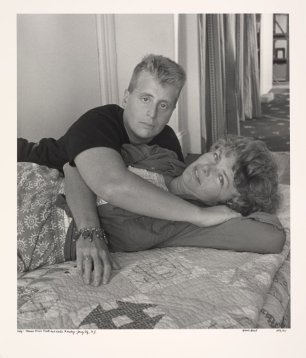
Minnie Bruce Pratt and Leslie Feinberg, 1993
Robert Giard started photographing gay and lesbian writers throughout the United States in 1985 and, by the mid-90s, had amassed over 500 author portraits, capturing some of the era’s most voices, such as Alan Ginsberg and Dorothy Allison. Giard wanted to document the existence and triumph of these marginalized people who worked so tirelessly within a society largely ignorant to or resentful of their influence.
Before approaching an author, Giard would immerse himself in his or her work. Then, after “a period of personal exchange and contact,” he’d arrange to travel to wherever the author wanted their picture taken (most charged their homes). 182 of the portraits appear in Particular Voices: Portraits of Gay and Lesbian Writers.
Needless to say, I was excited to discover that 203 of the portraits are actually archived online at the New York Public Library’s Digital Gallery, and to kick off “The Way We Were”/Herstory Month, here are some of our favorite ladies from the photos Giard took in the late 80s.
+
Audre Lorde
Staten Island, NY // 1987
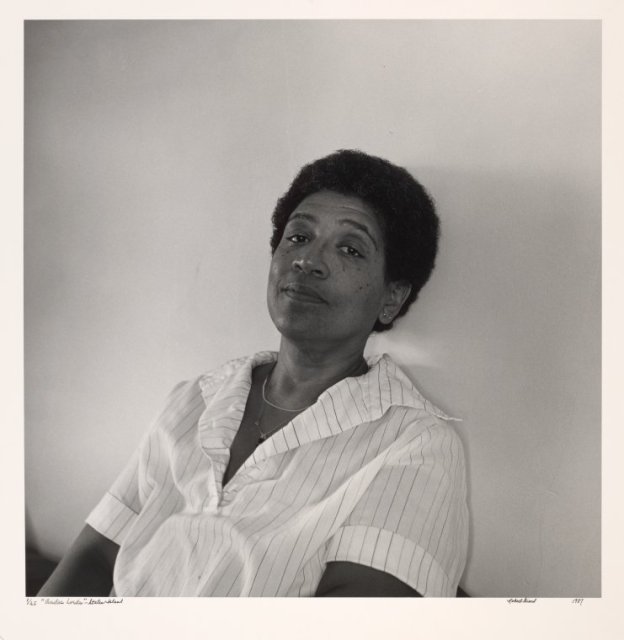
(1934-1992)
Poet, Essayist, Librarian, Teacher, 1991 Poet Laureate, founder of “Kitchen Table: Women of Color Press”
For example: Sister Outsider: Essays and Speeches and Zami: A New Spelling of My Name – A Biomythography
“I write for those women who do not speak, for those who do not have a voice because they were so terrified, because we are taught to respect fear more than ourselves. We’ve been taught that silence would save us, but it won’t.”
+
+
Gloria Evangelina Anzaldua
Oakland, CA // 1988
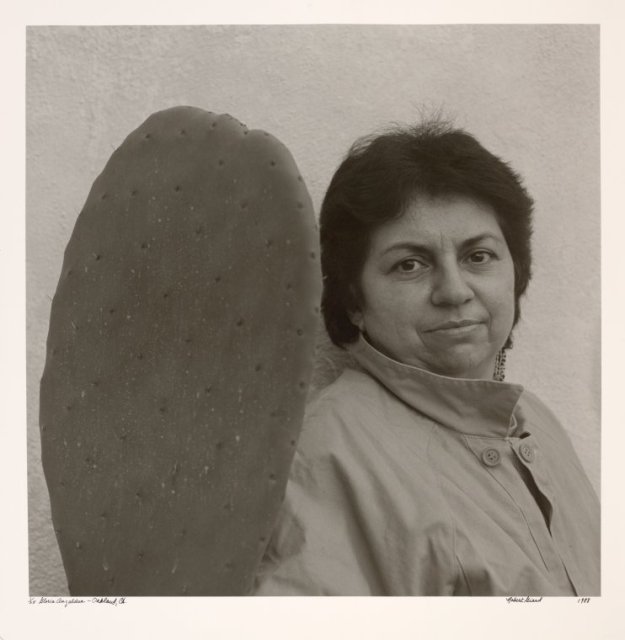
(1942-2004)
Writer, Educator, Editor, Activist
For Example: Borderlands/La Frontera, Third Edition: The New Mestiza, This Bridge Called My Back: Writings by Radical Women of Color (editor)
+
“Why am I compelled to write? Because the writing saves me from this complacency I fear. Because I have no choice. Because I must keep the spirit of my revolt and myself alive. Because the world I create in the writing compensates for what the real world does not give me. By writing I put order in the world, give it a handle so I can grasp it.”
+
+
Joan Nestle
New York, NY // 1987
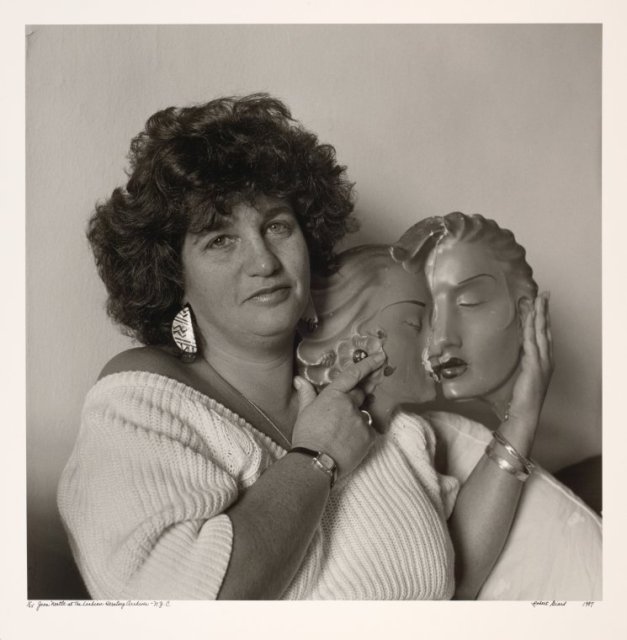
(b.1940, Bronx, NY)
Writer, Archivist, Educator & Activist, co-founder of the Lesbian Herstory Archives
For example: A Restricted Country, “Butch-Fem Relationships: Sexual Courage in the 1950s,” The Persistent Desire: A Femme-Butch Reader
+
“To Live without history is to live like an infant, constantly amazed and challenged by a strange and unnamed world. There is a deep wonder in this kind of existence, a vitality of curiousity and a sense of adventure that we do well to keep alive all of our lives. But a people who are struggling against a world that has decreed them obscene need a stronger bedrock beneath their feet.”
+
+
Cheryl Clarke
Jersey City, NJ // 1987
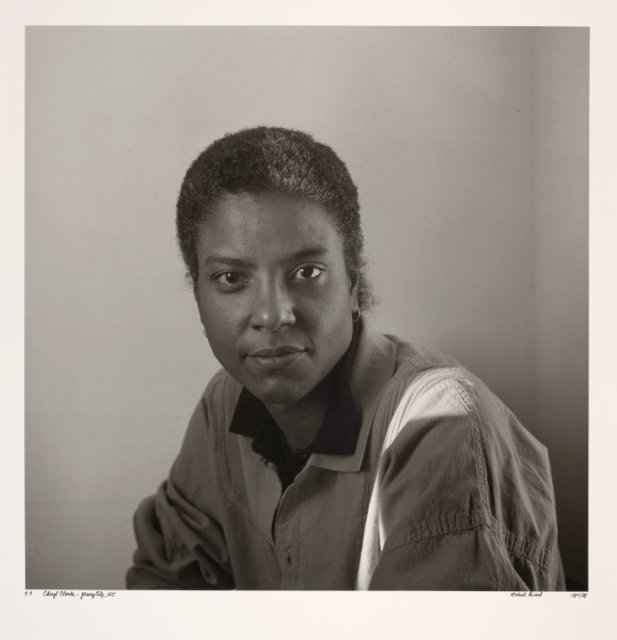
(b.1947, Washington DC)
Poet, Critic, Essayist, Activist, Served on editorial collective for “Conditions”
For example: Narratives: Poems in the Tradition of Black Women, The Days of Good Looks: The Prose and Poetry of Cheryl Clarke, 1980 to 2005
+
“I count the support and encouragement of women as my primary motivation for writing.”
+
+
Kitty Tsui
Oakland, CA // 1988
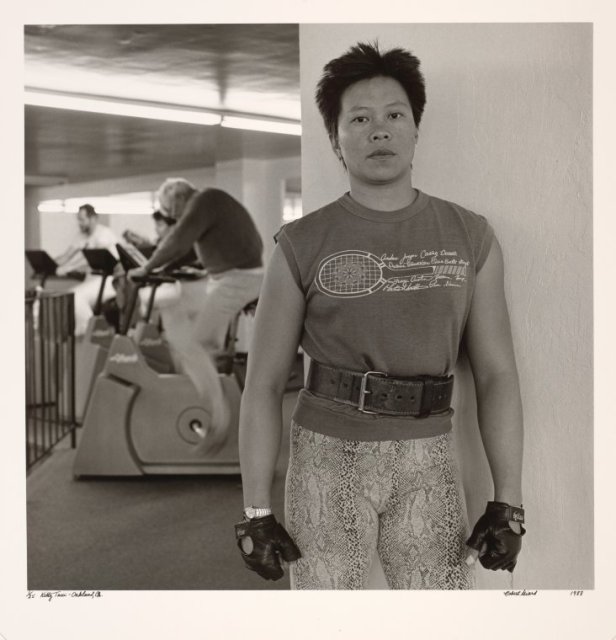
(b.1952, Hong Kong)
Poet, Short-Story Writer, Journalist, Activist, Bodybuilder, one of the founders of the Unbound Feet Collective
For example: The Words of a Woman Who Breathes Fire, Breathless: Erotica
+
“i want to tell them: my back is healing.
i dream of dragons and water.
my home is in her arms,
our bedroom ceiling the wide open sky.”
-from “A Chinese Banquet” (1983)
+
+
Olga Broumas
Provincetown, MA // 1987
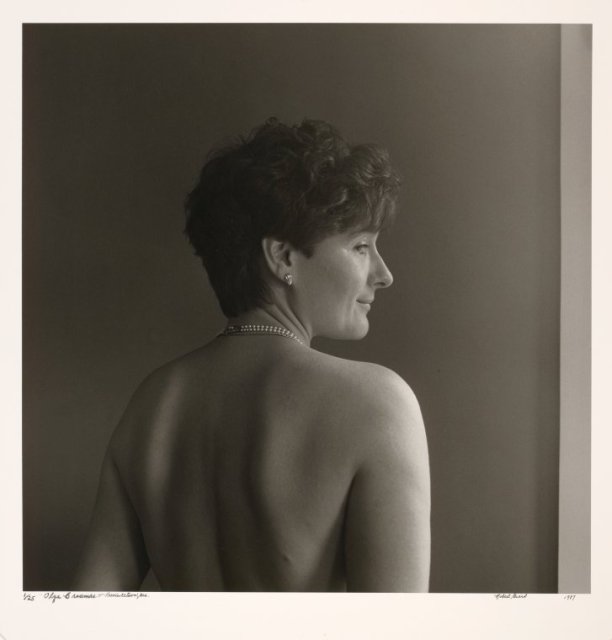
(b.1949, Greece)
Poet, Translator, Educator
For example: Beginning with O, Sappho’s Gymnasium
+
I kept to the road, kept
the hood secret, kept what it sheathed more
secret still. I opened
it only at night, and with other women
who might be walking the same road to their own
grandma’s house, each with her basket of gifts
– from “Little Red Riding Hood”
+
Jewelle Gomez
Jersey City, NJ // 1987
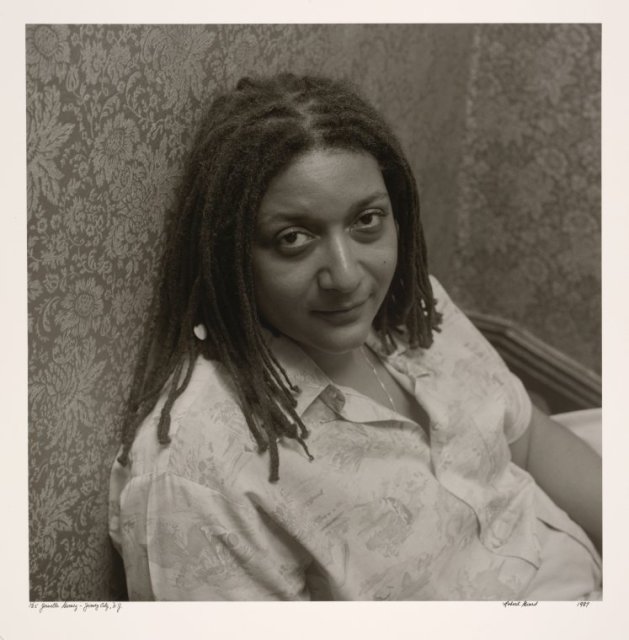
(b.1948, Boston)
Writer, Activist, founding board member of GLAAD
For example: The Gilda Stories: A Novel, Forty-Three Septembers: Essays
+
“When I arrived in New York City in 1971 after graduating from college in Boston I knew only two things for sure: I wanted to be a writer and I was a lesbian. I was at a complete loss as to what to do about either of my identities.”
+
+
Barbara Smith
Albany, NY // 1987
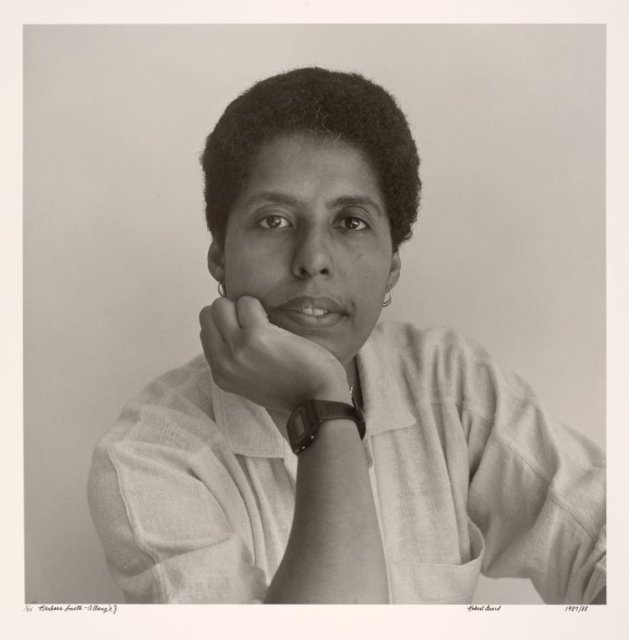
(b. 1946 , Cleveland)
Writer, Educator, Historian, Activist, Activist and Educator, Co-founder of Kitchen Table: Woman of Color Press, establisher of the Combahee River Collective.
For Example: “Toward a Black Feminist Criticism,” Home Girls: A Black Feminist Anthology
+
“Almost all of my writing has been about empowerment and about trying to say to people of color, to women, to lesbians and gay men that you really are worth something, you are important, you have a history to be proud of. There is no reason to be ashamed.”
+
+
Holly Hughes
New York, NY // 1988
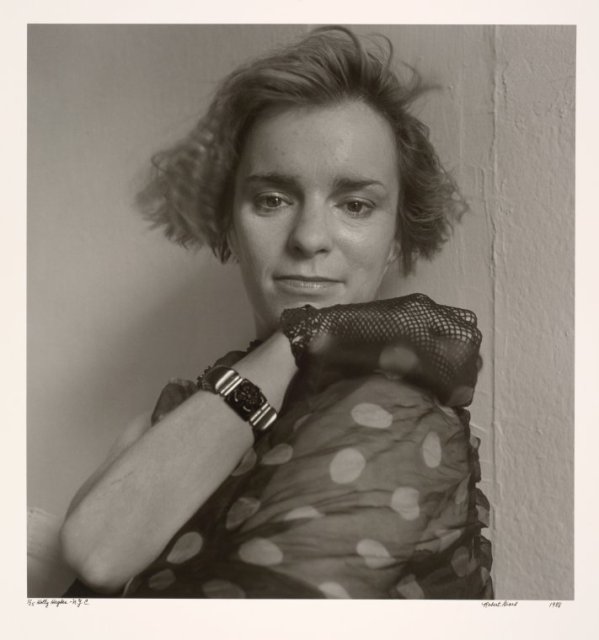
(b. 1955, Michigan)
Performance Artist, Painter, Writer
For example: Clit Notes
+
“I spent my entire childhood in a coma. Then I turned twenty and I kissed a woman. Sort of by accident. But she kissed me back. With a purpose. An inention I couldn’t guess. Something started happening to me. Something that the expression ‘coming out’ doesn’t quite cover. In my case, it was more a question of coming to.”
++
Barbara Grier (pictured w/Donna McBride)
New York, NY // 1989

(1933-2011)
Activist, Editor, Publisher, Writer, Bibliographer, Editor for The Ladder, founder of Naiad Press (usually used pseudonym of “Gene Damon”)
For Example:
For Example: The Lesbian in Literature
+
“Marriage creates visibility. When we are banned from marrying, we are kept from doing publicly the ordinary and rational things people do anyway — marry, settle down, get jobs, and live like everyone else.”
+
+
Pat Parker
Pleasant Hill, CA // 1989
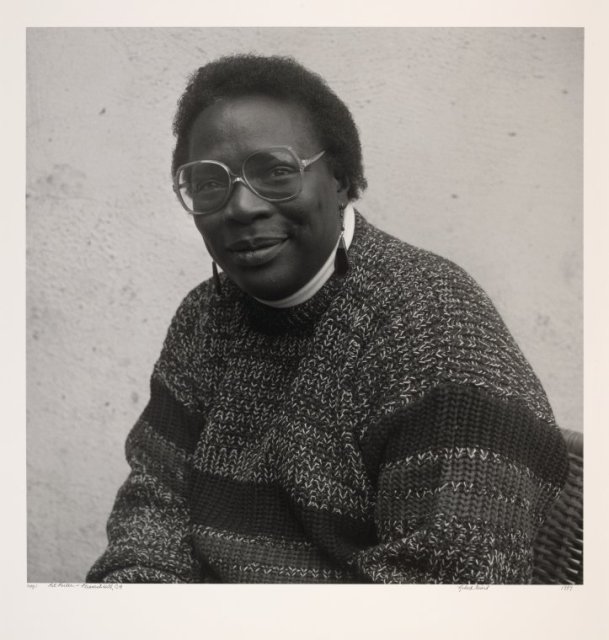
(1944-1989)
Poet, Activist, Educator, Women’s Health Care Worker
For example: Child of Myself, Movement in Black
+
“I’m waiting for the revolution that will let me take all my parts with me.”
+
+
Donna Kate Rushin
Cambridge, MA // 1987

Writer, Poet, Activist, Educator
For Example: The Black Back-Ups: Poetry by Kate Rushin, The Bridge Poem
+
“The bridge I must be is the bridge to my own power; I must translate my own fears, mediate my own weaknesses; I must be the bridge to nowhere but my true self; and then I will be useful.”
+
+
Judy Grahn
Oakland, CA // 1988
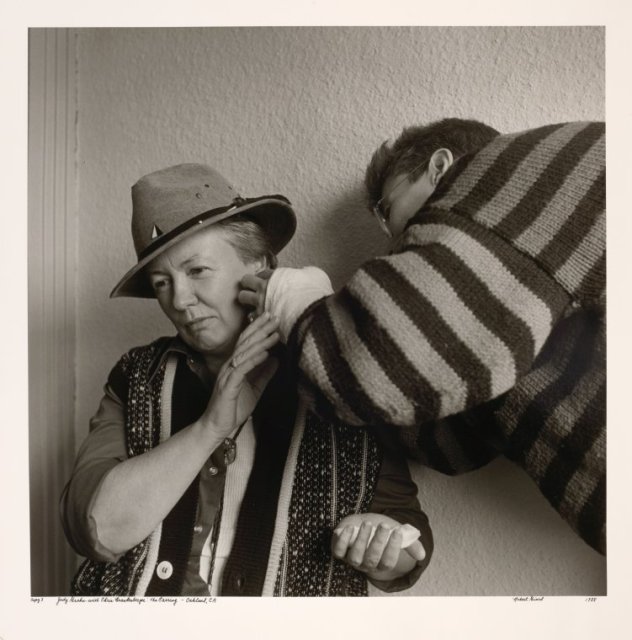
(b.1940 in Chicago)
Writer, Cultural Theorist, Activist, Publisher, founded Women’s Press Collective
For Example: The Common Woman, Edward the Dyke And Other Poems, Another Mother Tongue
+
I’m not a girl
+++I’m a hatchet
I’m not a hole
+++I’m a whole mountain
I’m not a fool
+++I’m a survivor
I’m not a pearl
+++I’m the Atlantic Ocean
I’m not a good lay
+++I’m a straight razor
look at me as if you had never seen a woman before
I have red, red hands and much bitterness
+
Sapphire
New York, NY // 1988
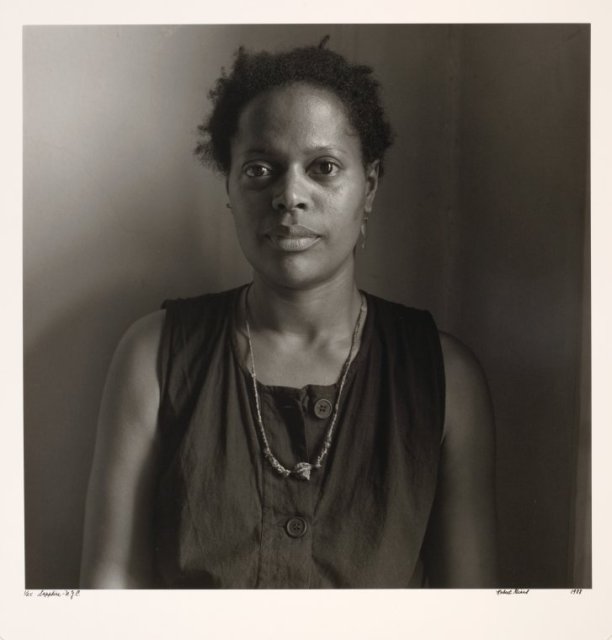
(b. 1950, Monterey, CA)
Author & Performance Poet, founded “Naps” (first black lesbian performing group in the country)
For example: Push, Black Wings & Blind Angels: Poems
“The culture wants us obsessed and addicted; they don’t want us joyous and happy. The tarot card of the sun with the child naked and joyful — well, I feel I deserve that, too! Whether I get it at forty, fifty or whatever — I deserve that kind of joy. I see animals happy; why the fuck can’t I be happy? And by happiness I don’t mean “having everything.” What kind of culture is this that breeds materialism, misery and depression? How come I can’t be happy? I think that’s part of healing: not just saying “I survived, I made it,” but somewhere finding an ecstasy in my heart.”
+
Sarah Schulman
New York, NY // 1988
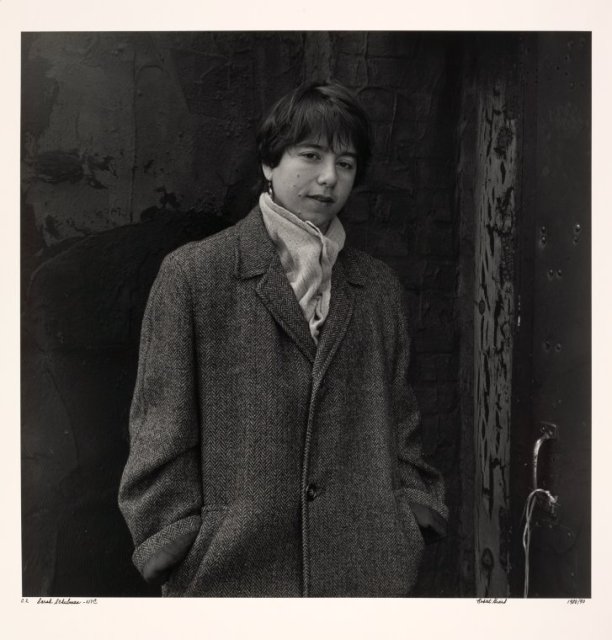
(b.1958, New York)
Writer, Radical Activist, Novelist, co-founder of The Lesbian Avengers
For Example: Empathy, Ties That Bind: Familial Homophobia and Its Consequences
“I am afraid too. I am frightened all the time, but I do not let the fears determine my behavior. How I act and whether or not I am afraid are two separate things in my process. I think questions such as, is this doable, reasonable, and morally sound? What are the consequences going to be when I do this? I know I will make some people mad but can I actually achieve something positive? If I think I can be effective, I allow myself to feel afraid. The problem is when people act because they are afraid. These two things need to be separated. It is okay to feel uncomfortable. If you are going to create anything worthy, you are going to feel uncomfortable and other people are going to make you feel uncomfortable, and that has to be accepted as part of life. If you want to feel safe all the time, you will never be able to do anything.”


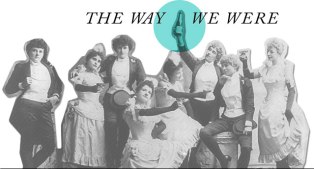

This is fantastic, I can’t wait for the rest of the posts!
Coincidentally I read Anzaldua’s ‘Borderlands/La Frontera’ this morning and highly recommend it!
that book blew my mind. i remember sitting in the library crying my eyes out reading it and going ohhhhmygod “theory” can actually be poetic and beautiful and real.
I actually audibly giggled on the first page, she just captures everything so mind staggeringly beautifully.
Thank you for introducing me to Pat Parker! You guy might like this thing I stumbled upon — it’s her reading an ultra sad, ultra powerful poem she wrote about the death of her sister:
http://www.youtube.com/watch?v=W1A6BP1kIzQ
“men cannot rape their wives
men cannot kill their wives
they passion them to death”
I apologize to autostraddle for double posting; however, I do think the page that comes up to tell you to “slow down; you’re posting too quickly” is adorable and kind of calming in an authoritative way.
woah this is all kinds of great
I’m going to come back and check out the writings of some of these wonderful ladies. However in the meantime I just want to say that I love looking at the faces of strong, intelligent, queer women, it’s calming in a way that sounds too pretentious in my head to describe.
Lesbian women, not queer women.
Many of these women have referred to themselves and others as queer, at least one identifies as bisexual. I was attempting to be inclusive.
And rightly so. Unless Cathy Brennan happens to know these women personally and has been informed by each of them firsthand how they prefer to be identified, she is merely trolling her own opinion of what kind of language we should be using.
Your ignorance is only outweighed by your arrogance.
You’re condescendingly telling people how to speak, and I’m the one who’s arrogant? That’s rich, sister.
the name of the article is even Portraits of Lesbian Writers, 1987-1989
are you arguing with the author?
Sapphire identifies (at least currently) as bisexual.
I am of course open to correction on this, but I googled it and she is consistently referred to as bisexual.
Thank you, thank you for this. I ran into the work of many of these fine women in a college class in ’89 and I was different after, more myself, ‘coming out and coming to’. See? This is why you do what you do, because it is WORDS shared that change the world one human being at a time. Amen. Hallelujah.
PREACH
holy shit i know olga broumas IRL, she taught at my undergraduate institution and i spent four years there never knowing she was queer. jesus christ
Lesbian, not queer.
ah that is so cool.
I loved this article, and especially the quote from Sarah Schulman.
SARAH SCHULMAN IS THE SHIT. and she still is. man i’m so glad these people are around. i feel so so lucky to have such a rich history to draw from as a homo and a woman.
…and a writer. can’t forget about that.
Oh, Sapphire. Thanks for that.
Thanks for this. I’ve read a few of the works mentioned, but I want to read everything now.
THIS: “I think that’s part of healing: not just saying ‘I survived, I made it,’ but somewhere finding an ecstasy in my heart.” Thanks, Riese, for exponentially increasing my to-read list. :)
Props to strong ladies through time and their amazing creative brains……… but some of these pictures look like they belong on fail blog. C’mon, just being real.
Unf. Audre Lorde. BEST POST EVER.
hello new reading list.
I love this so much! I really appreciate that there are WOC feminists included.
*WOC writers, though some of them certainly are feminists as well.
absorbing all of this. pronto
This is amazing. Thank you, Autostraddle. I just read the article about the boy with the hateful radio show–and then this, about amazing queer writers. I love this site for offering both. And recipes. And so much else! Thanks for all you do for us. :)
Lesbians. Not queers. Lesbians exist. These are your foremothers. They are lesbians.
i’m rolling my eyes at you.
um …. what’s the name of the article? Oh yeah Portraits of Lesbian Writers, 1987-1989
wonder why.
Look out, it’s the label police!
That pic of Joan Nestle is amazing.
happy priiiiiiide
Thank you for including my portrait here by lovely Robert.I just wanted to correct the quote which ends in a different place then this beginning indicates, if I may. “To Live without history is to live like an infant, constantly amazed and challenged by a strange and unnamed world. There is a deep wonder in this kind of existence, a vitality of curiousity and a sense of adventure that we do well to keep alive all of our lives. BUT A PEOPLE WHO ARE STRUGGLING AGAINST A WORLD THAT HAS DECREED THEM OBSCENE NEED A STRONGER BEDROCK BENEATH THEIR FEET.
omg, wow! hi joan nestle! the quote has been fixed!
I’d like to take a moment to also give props to May Swenson (http://en.wikipedia.org/wiki/May_Swenson). She was the sister of a dear, dear friend and mentor of mine who passed away a few months ago. The last time I spent time with him was on my birthday last year (so nearly a year ago). He read her poetry to me while I prepared food in the kitchen.
She is an amazing and brilliant writer, and she holds a special place in my heart not just because her brother was such a dear friend to me, but because she also grew up Mormon.
Thanks so much for this list. I’m sure that all of us who consider ourselves writers or literary at all have our queer literary heroes. It is nice to see these beautiful faces paired with their words.
Queer is doubtless an inclusive term. It is also important to acknowledge differences. As Audre Lorde said, “It is not our differences that divide us. It is our inability to recognize, accept, and celebrate those differences.” Labeling self-identified lesbians as “queer” is policing as well, and no one stepped up to address that. Some of these women writers may be lesbian, some bisexual, and some queer. Why force queer on everyone? Their work is amazing and rich.
“Queer” in its present-day usage is widely understood to be an umbrella term for mostly anyone who doesn’t identify as straight. Using it to speak collectively about a group of people with disparate identities is a sane and logical employment of the English language, not “policing”.
Where is this coming from? I used the word “lesbian” to describe every woman on this list, as they all identified as such at the time (though some have changed how they identify since). Lesbian is in the title, in the post… the word “queer” does not exist in this post…
I’ve been super-confused about the critiques of the word “queer” in the comments… then I realized it was used in the “excerpt” (the 2 sentences that appear on the front page when the post is first published and in your RSS reader, but nowhere in the actual post or post title.), wherein the excerpt says: “Robert Giard took 500 photographs of queer writers in the 80′s and 90′s.” I’m not talking about individuals in that sentence, but a group, that group includes men and women. 500 writers. I’ve only seen 200 of the pictures myself, I’m guessing that I don’t know jack about 75% of them, saying “LGBT” would imply the presence of Bs and Ts and I’m not sure if that’s accurate, queer could go either way BUT REGARDLESS, i really think that this is not a big deal! every individual has been properly identified. the excerpt vanishes from the internet in two weeks when this post joins the archives, only leaving behind this post with its headline and words. I feel like this conversation will be confusing to the children of the future who see no usage of the word “queer” anywhere in this post, and I’m concerned about those children and their health and happiness.
Won’t somebody please think of the children!?
I don’t think the title of the post is the issue as much as the use of the word queer in the comments. Queer is a term that is increasingly used in a way that erases lesbian identity. By lesbian, I mean female homosexual. Queer includes bi, trans, and “genderqueer,” which is fine for those who claim that term, but not okay for women who are lesbian and feel, as I do, that lesbian identity is being eclipsed in the LGBTQ alphabet world. I don’t think it’s trivial or “policing” in this context because the lesbians featured here are our heroes and foremothers. They hold a sacred place in our hearts and history, so we should respect their self identification. It is a sensitive point and deserves respect.
Can you explain to me – and this is a serious question – how you think an inclusive term is erasing your identity? How does allowing the inclusion of bi, trans, and genderqueer identities in any way erase yours? An umbrella term does not negate the individual identities it encompasses any more than the word “flowers” negates the existence of individual roses, tulips and carnations.
Frankly this sounds an awful lot to me like the same line of argument that privileged white Christian males use when they think that minority interests are infringing on their God-given right to be at the top of the visibility list. Bisexual and trans identities are ignored, dismissed and denied constantly, within the queer community as well as without, and resisting attempts to include them by claiming your own erasure is simple elitism.
(Did I really just use a flower metaphor? How twee.)
Chandra, lesbians are not at the top of the visibilty list. Here is an example: at the NGLTF conference in Baltimore this past year there were 350 different workshops and presentations. Out of 350 workshops, one (1) was specifically for lesbians or had the word lesbian in the title. There were full day tracks and meeting rooms and social events for trans, bi, poly, pan, etc, but virtually nothing for lesbians. Lesbians have social, health, and political issues that are unique to us as women (and, yes, as biological females). Those issues are ignored by mainstream LGBTQ organizations.
I don’t think it’s fair, or in good faith, for you to compare my concerns to that of our common oppressor. I am a lesbian. I have worked diligently, and with sacrifice, for nearly 30 years for the rights and safety of gay men, lesbians, bisexuals and transgender people in my community. My comment is merely asking for sensitivity and respect for the lesbian identities of the women in this wonderful feature.
I strongly disagree that lesbian social, health and political issues are ignored by LGBTQ organizations, and especially that they are ignored to any greater extent than those of other sexual minorities within the spectrum, but I’m not going to get any further into this because it REALLY isn’t the point. The point is that your identity is not being actively erased by including others in an umbrella term.
You, as an individual, have every right to insist that people not identify you, personally, as queer. No problem with that. But to insist that people not use a perfectly well-established collective term to talk about a group of women, when a) those women to our knowledge never explicitly rejected being included under such an umbrella term and b) at least one commenter indicated that she used the term “queer” because one of the women identifies as bisexual – that is language policing.
I’d also like to point out that the person who initially sparked this discussion, by repeatedly insisting on her point throughout the comments, is a transphobic radfem with a well-established web presence (Google her name and see for yourself). Her rejection of the term “queer” is explicitly due to a rejection of trans identities, and has nothing to do with requesting “sensitivity and respect” for the women discussed in this post.
“You, as an individual, have every right to insist that people not identify you, personally, as queer. No problem with that.” Thanks, Chandra, that is really generous of you.
I was also going to add that the “queer/lesbian” thing may also be a generational difference. I am in my late 40’s and it was a big deal for me in my lifetime to embrace the word lesbian. It has been empowering in ways too numerous to mention. I do not identify as queer and I respectfully disagree that it is fully acceptable to use in reference to all lesbians. It’s definitely more acceptable to younger lesbians, but I would suggest it’s not so true for my generation and older. I could be wrong about it, but it’s just my perception.
And I’m not here to debate or argue. I really enjoy this site and I respect and appreciate the work that goes into it. I only replied to your comment because you said that you were asking a serious question. I gave a thoughtful reply with a concrete example. Obviously, you were just saying that so you could shoot down whatever I said and reiterate your point. So, I’m going to exit this topic because no one likes to read other people’s pugilism.
Oh, and thank you for this amazingly beautiful post. These writers gave me strength in my youth, helped me face the world as young woman, feminist, survivor, and lesbian. When I emerged from a corner of my college library where I read their poems, essays, erotica, and novels, I was prepared to be myself at all cost. This has motivated me to go back for a refresher!
oh, i love this so much.
thank you riese, this herstory series is amazing so far. can’t wait to see what else you have in store for us.
I feel like I have been doing a lot of debating in the comments without actually commenting on the post itself, and I feel bad about that because it’s really pretty great and deserves lots of accolades. Thank you for posting this wonderful post and introducing me to the stories of these amazing women!
Pingback: Pride, In The Name of Lesbians « You think I just don't understand, but I don't believe you.
Love that this got a shout out on Jessica Crispin’s (The Book Slut’s) twitter this morning!
We’re here, and we’re queer! Lesbians are some of the most productive contributors to American society.
Pingback: Klicktipp: „Portraits of Lesbian Writers, 1987-1989“ (Weblog-Eintrag) « Salon 21
Pingback: Lesbian/Queer Women Link Love #4 – Selected Tales